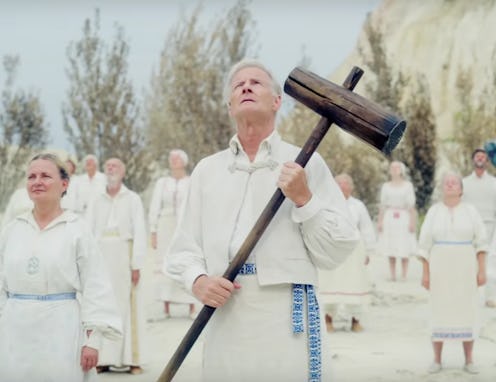Entertainment
‘Midsommar’ Isn’t As Shocking As ‘Hereditary,’ But It’ll Still Chill You To The Bone
Hereditary director Ari Aster's latest film Midsommar looks suspiciously pleasant. Dulcet folk songs drift over sun-drenched fields filled with white-wearing, flower-crowned revelers celebrating the solstice. But as hallucinogenic distortions kick in and the sun becomes blinding, you might start to ask, just how scary is Midsommar, really? Though there's gore enough to warn the squeamish, calling the July 3 release a horror film is misleading. Spoilers ahead!
If horror films are defined as intentionally using the fear response for entertainment, Midsommar fails even that broad category. Though there's a constant sense of unease and off-kilter uncertainty, the film's few potential scares aren't set up to shock. When recently traumatized Dani (Florence Pugh), tagging along to a remote Swedish village with self-interested boyfriend Christian (Jack Reynor) and his friends, finds herself too high on magic mushrooms near the film's start, she walks into the one shady, isolated spot — a small bathroom shack. A horror movie would shock us by sudden revelation someone else is in there. She'd close a mirror and we'd see along with her, or something would suddenly move in the dark. Instead, the shot is held steady, the stranger present in the mirror's reflection. The only dread is us realizing it and waiting for Dani to (which doesn't happen).
Other potential frights involve physical horror. At the Hårga cult's first ceremony, a gruesome fall seen at a distance is followed by the mangled body shown close-up. Again, it's not done to scare, though the sheer awfulness of how the human body can break is on full display. Instead it's shown to set up the Hårga's main trait: empathy. The entire group wail in pain along with the elder who just sacrificed himself — though not entirely successfully — until two members who've held a ludicrously large mallet the entire time step forward and reveal the purpose of it. They finish the job. Brutal, yes — horror, only in the sense of sympathetic flinching.
While audiences might not know exactly what's coming, the Hårga don't really hide much from their guests. They tell them about their nine-day celebration, but with the exception of two of the film's non-white characters, none of the self-absorbed visitors really listen. We don't see people's gruesome deaths one after another, slasher-style. People just disappear suspiciously. The first time we see anyone actually attacked, it's not unexpected: after deciding to make the Hårga his thesis focus, anthropology student Josh (William Jackson Harper) is explicitly forbidden from taking photos of their sacred book. So when he "breaks in" to the temple, it's pretty clear from the music and setup he's going to face some serious, sudden repercussions. (There aren't any locked doors in town, or even many doors. The village is the polar opposite of the usual creepy attics and dark basements of the genre.)
There's also a freaky Viking-style flaying and post-mortem body modification that, while not bloody, will have most viewers internally squirming. But again, they're not set up to make you jump. They're presented pretty quietly and at length.
None of this anti-horror should come as a surprise; speaking to Film Comment back when Hereditary came out, Aster made his intentions pretty clear. "When people ask if I consider myself a horror director, I’ll be quick to respond with a very clear no, absolutely not," he said. He went on to explain that "the films that always got to me were operating on more of an existential level...That stuff’s not pleasant and we think we go to horror movies to avoid them. We want to go to an experience, we want to be riveted, taken on a ride, and we want to be scared."
Sudden shocks are fun for horror aficionados; what we don't want is what Aster offers: reflection on uncomfortable questions that keep up us at night. What if we die alone? What if we do something terrible to people we love, and we're not forgiven? What if we're not good people? The central focus of Midsommar is empathy — too much of it with the Hårga, and too little of it among Dani's friends. Repression, trauma, loss, empowerment at others' expense — these are the horrors of the film.
The one thing Midsommar does have in common with many horror films is a healthy helping of dry humor. Nothing balances out terrors existential or otherwise like quietly catty comments or physical humor. "So no one's going to mention the bear, then?" wouldn't be quite as funny without the uncertainty of what that bear is actually doing in the middle of the village.
So if you can bear with (sorry) some hallucinogenic uncertainty, an uncomfortable number of white people in one place, and some gruesome imagery, Midsommar might just be the summer freak folk film you're looking for.
